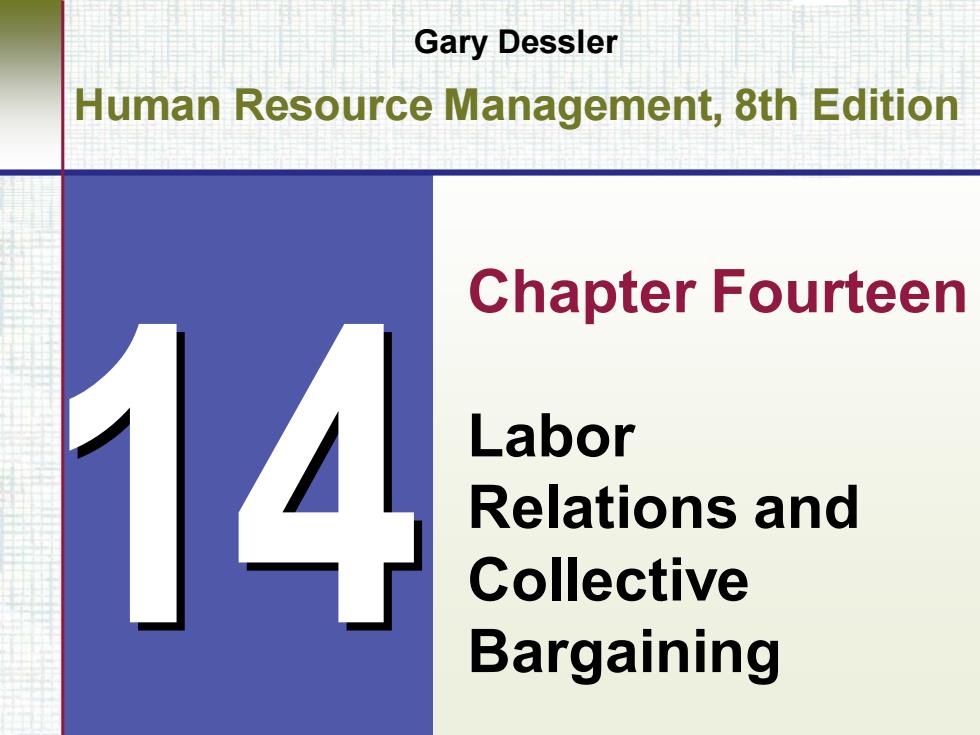
Gary Dessler Human Resource Management,8th Edition Chapter Fourteen Labor Relations and Collective Bargaining
Gary Dessler Human Resource Management, 8th Edition Chapter Fourteen Labor Relations and Collective Bargaining
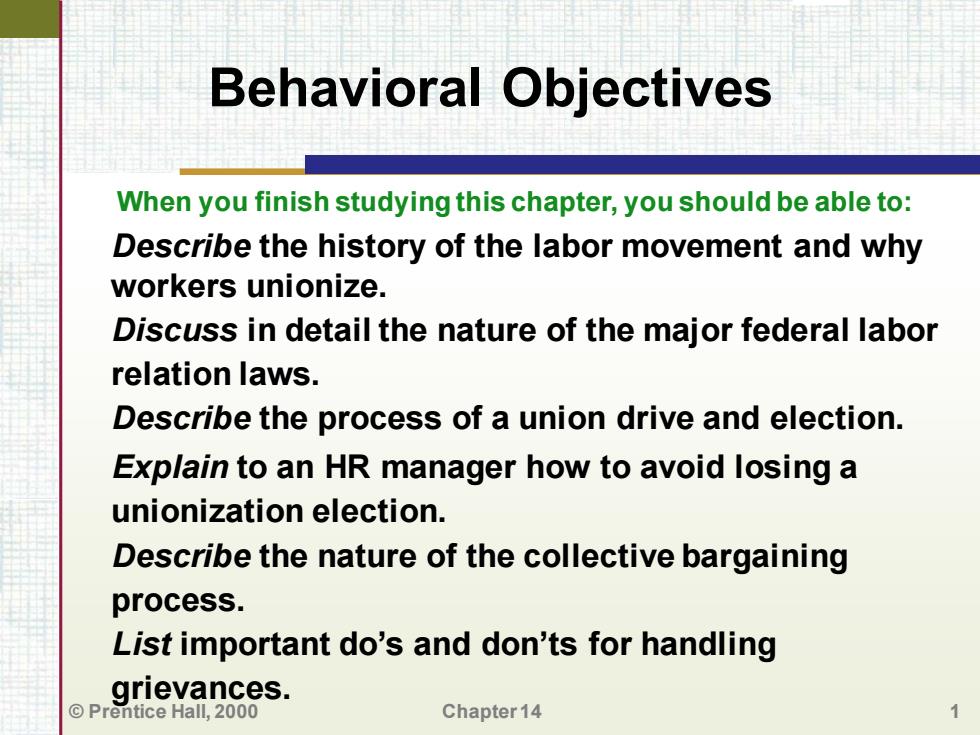
Behavioral Objectives When you finish studying this chapter,you should be able to: Describe the history of the labor movement and why workers unionize. Discuss in detail the nature of the major federal labor relation laws. Describe the process of a union drive and election. Explain to an HR manager how to avoid losing a unionization election. Describe the nature of the collective bargaining process. List important do's and don'ts for handling grievances. ©Prentice Hall,2000 Chapter14
© Prentice Hall, 2000 Chapter 14 Behavioral Objectives Describe the history of the labor movement and why workers unionize. Discuss in detail the nature of the major federal labor relation laws. Describe the process of a union drive and election. Explain to an HR manager how to avoid losing a unionization election. Describe the nature of the collective bargaining process. List important do’s and don’ts for handling grievances. When you finish studying this chapter, you should be able to: 1
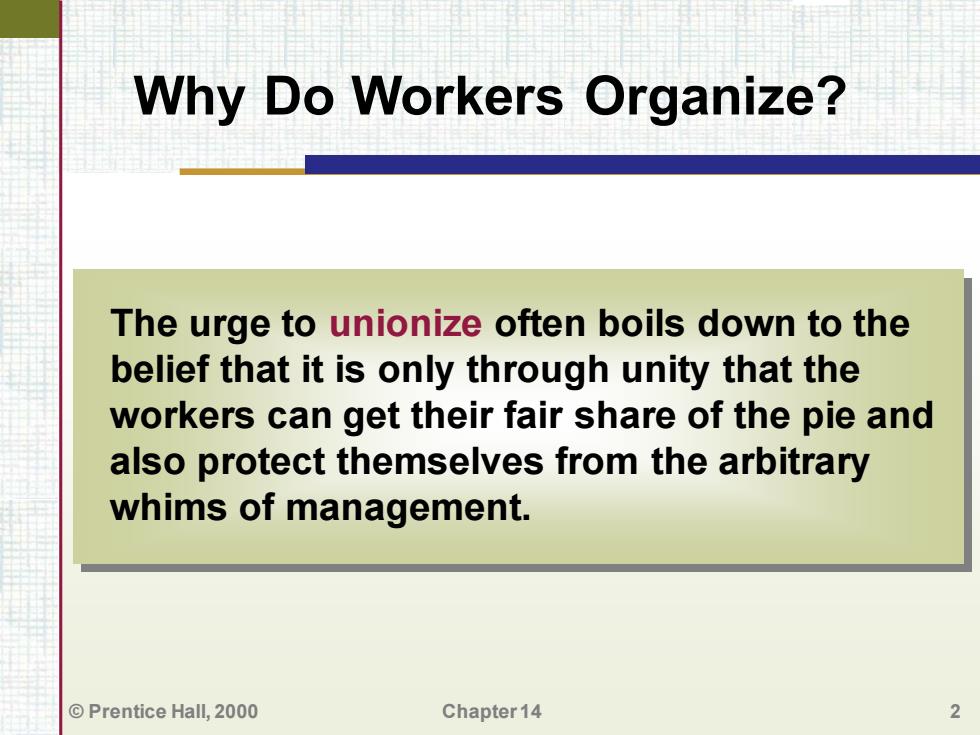
Why Do Workers Organize? The urge to unionize often boils down to the belief that it is only through unity that the workers can get their fair share of the pie and also protect themselves from the arbitrary whims of management. ©Prentice Hall,2000 Chapter14 2
© Prentice Hall, 2000 Chapter 14 Why Do Workers Organize? The urge to unionize often boils down to the belief that it is only through unity that the workers can get their fair share of the pie and also protect themselves from the arbitrary whims of management. 2
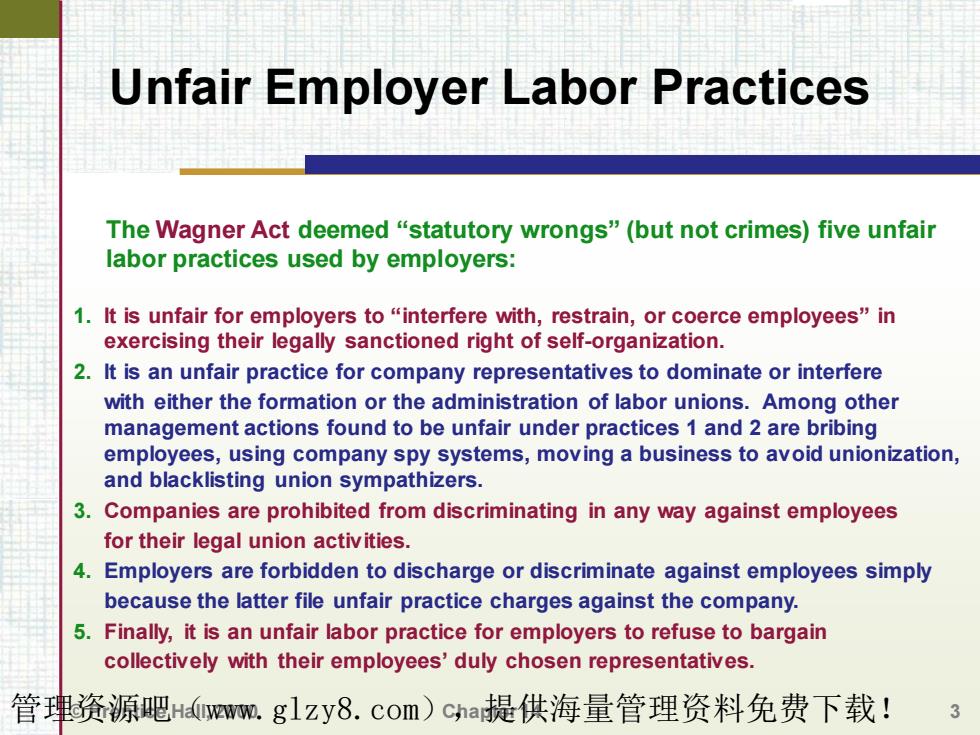
Unfair Employer Labor Practices The Wagner Act deemed"statutory wrongs"(but not crimes)five unfair labor practices used by employers: 1.It is unfair for employers to "interfere with,restrain,or coerce employees"in exercising their legally sanctioned right of self-organization. 2.It is an unfair practice for company representatives to dominate or interfere with either the formation or the administration of labor unions.Among other management actions found to be unfair under practices 1 and 2 are bribing employees,using company spy systems,moving a business to avoid unionization, and blacklisting union sympathizers. 3. Companies are prohibited from discriminating in any way against employees for their legal union activities. 4.Employers are forbidden to discharge or discriminate against employees simply because the latter file unfair practice charges against the company. 5.Finally,it is an unfair labor practice for employers to refuse to bargain collectively with their employees'duly chosen representatives. 管理资源吧Hwww.glzy8.com)cha提供海量管理资料免费下载! 3
© Prentice Hall, 2000 Chapter 14 Unfair Employer Labor Practices The Wagner Act deemed “statutory wrongs” (but not crimes) five unfair labor practices used by employers: 1. It is unfair for employers to “interfere with, restrain, or coerce employees” in exercising their legally sanctioned right of self-organization. 2. It is an unfair practice for company representatives to dominate or interfere with either the formation or the administration of labor unions. Among other management actions found to be unfair under practices 1 and 2 are bribing employees, using company spy systems, moving a business to avoid unionization, and blacklisting union sympathizers. 3. Companies are prohibited from discriminating in any way against employees for their legal union activities. 4. Employers are forbidden to discharge or discriminate against employees simply because the latter file unfair practice charges against the company. 5. Finally, it is an unfair labor practice for employers to refuse to bargain collectively with their employees’ duly chosen representatives. 管理资源吧(www.glzy8.com),提供海量管理资料免费下载! 3
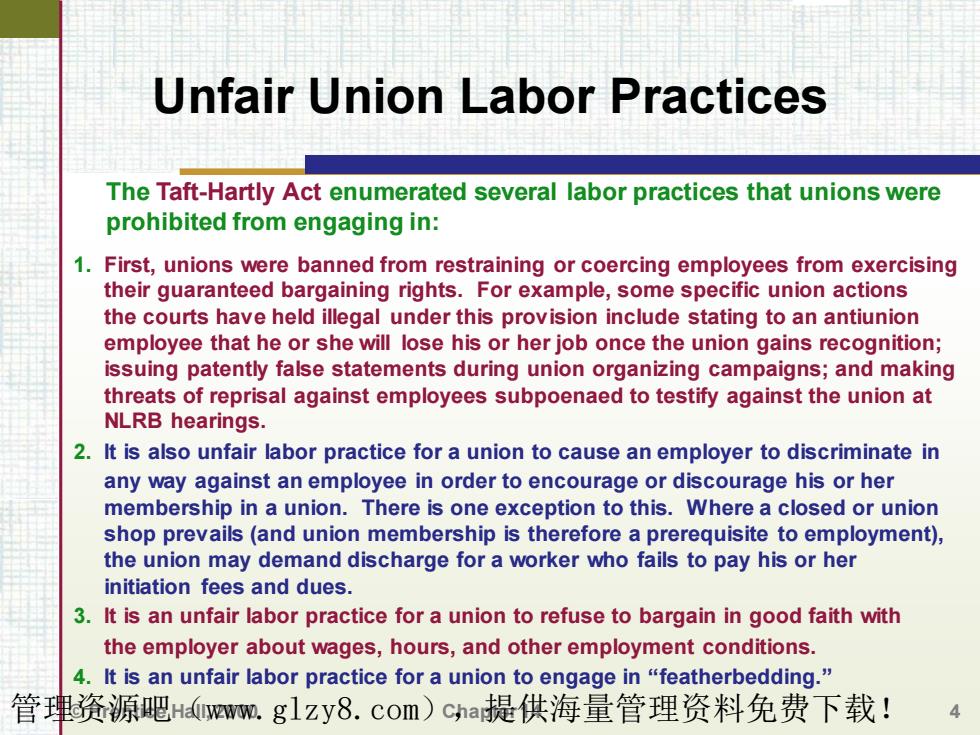
Unfair Union Labor Practices The Taft-Hartly Act enumerated several labor practices that unions were prohibited from engaging in: 1.First,unions were banned from restraining or coercing employees from exercising their guaranteed bargaining rights.For example,some specific union actions the courts have held illegal under this provision include stating to an antiunion employee that he or she will lose his or her job once the union gains recognition; issuing patently false statements during union organizing campaigns;and making threats of reprisal against employees subpoenaed to testify against the union at NLRB hearings. 2.It is also unfair labor practice for a union to cause an employer to discriminate in any way against an employee in order to encourage or discourage his or her membership in a union.There is one exception to this.Where a closed or union shop prevails(and union membership is therefore a prerequisite to employment), the union may demand discharge for a worker who fails to pay his or her initiation fees and dues. 3.It is an unfair labor practice for a union to refuse to bargain in good faith with the employer about wages,hours,and other employment conditions. 4.It is an unfair labor practice for a union to engage in "featherbedding. 管理资源吧Hwwm.glzy8.com)cha提供海量管理资料免费下载!
© Prentice Hall, 2000 Chapter 14 Unfair Union Labor Practices The Taft-Hartly Act enumerated several labor practices that unions were prohibited from engaging in: 1. First, unions were banned from restraining or coercing employees from exercising their guaranteed bargaining rights. For example, some specific union actions the courts have held illegal under this provision include stating to an antiunion employee that he or she will lose his or her job once the union gains recognition; issuing patently false statements during union organizing campaigns; and making threats of reprisal against employees subpoenaed to testify against the union at NLRB hearings. 2. It is also unfair labor practice for a union to cause an employer to discriminate in any way against an employee in order to encourage or discourage his or her membership in a union. There is one exception to this. Where a closed or union shop prevails (and union membership is therefore a prerequisite to employment), the union may demand discharge for a worker who fails to pay his or her initiation fees and dues. 3. It is an unfair labor practice for a union to refuse to bargain in good faith with the employer about wages, hours, and other employment conditions. 4. It is an unfair labor practice for a union to engage in “featherbedding.” 管理资源吧(www.glzy8.com),提供海量管理资料免费下载! 4